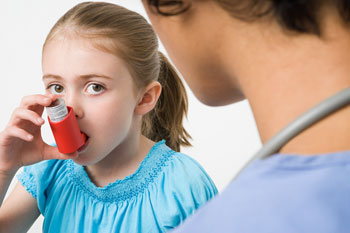Children with Asthma, Food Allergies Need a School Emergency Plan
December 2014
Children with Asthma, Food Allergies Need a School Emergency Plan
Children with asthma or a food allergy may find school a challenge. A sudden asthma attack or allergic reaction can quickly turn into an emergency. Unfortunately, not all students with these conditions have a care plan in place to help deal with such a situation.
In an emergency
The number of children with asthma and food allergies is growing. In fact, more than 10% of children now suffer from asthma. Around 8% have a food allergy—most often to nuts. These conditions can usually be managed. But an emergency can happen anytime, even during the school day.
Experts recommend that children with a chronic condition like asthma or a food allergy have a school emergency care plan. But a recent study suggests that too few children do. Researchers looked at the use of these plans in the Chicago Public School System. It’s the third largest public school district in the U.S. There, only a quarter of children with asthma and only half of those with a food allergy had such a plan on file.
An emergency care plan can help teachers and school employees properly care for a child during a health crisis. It’s also sometimes called a 504 Plan. This document may explain a child’s condition. It may provide step-by-step care instructions. It may also list current medicine, asthma triggers, or special dietary needs. It often contains the name and phone number of the child’s doctor.
A vital tool
An emergency care plan is a vital tool in your child’s care. School employees don’t always know how to care for a child who is suffering from an asthma attack or allergic reaction. They may not recognize the symptoms or know how to give needed medicine. In these cases, an emergency care plan can make a difference. It can save your child from a serious health scare.
If your child has asthma or a food allergy, work with his or her doctor to create a school emergency care plan. The following steps can also help protect your child during a health-related emergency:
Tell your child’s teachers and other school employees about your child’s condition. Be sure they know how to identify symptoms that the condition is getting worse.
Make sure your child has enough medicine on hand during the school day. See if the school can store extra asthma inhalers or epinephrine injections in case they are needed.
Give written consent. Your child’s school may require you to sign a form that allows staff members to contact your child’s doctor during an emergency. You may also need to fill out a similar form for your child’s doctor to talk to school staff.
Review your child’s emergency care plan every year. Update it as needed. Immediately notify the school if contact information for you or your child’s doctor changes.
An asthma action plan is another tool that can help your child better manage asthma. Find out more here.
Online resources
Updated:
March 21, 2017
Sources:
Assessing the Readiness of a School System to Adopt Food Allergy Management Guidelines. C. Eldridge. WMJ. 2014;113(4):155-61., Asthma and Food Allergy Management in Chicago Public Schools. R.S. Gupta, et al. Pediatrics. 2014;134(4):729-36., The Prevalence, Severity, and Distribution of Childhood Food Allergy in the U.S. R. Gupta, et al. Pediatrics. 2011;128(1):e9-e17., What Do School Personnel Know, Think, and Feel about Food Allergies? L. Polloni, et al. Clinical and Translational Allergy. 2013;3(1):1-8.
Reviewed By:
Turley, Ray, BSN, MSN
